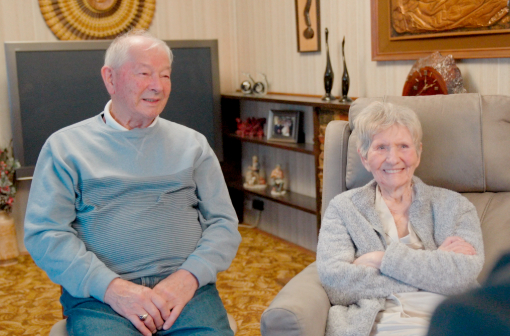“We know that staying physically and mentally engaged can make a big difference to how long you’re able to stay independent.”—Megan McDonald, Occupational Therapist with Remedy Healthcare Group.
Key points
- Having a long-term plan in place will give you flexibility and peace of mind.
- Staying as fit and healthy as you can is crucial to your independence.
- Making sure your home is practical and safe is also highly important.
Have you thought about where you’d like to live as you get older? If you want to spend as much time as possible at home, it’s never too early to put a long-term plan into place.
Whatever your age—but especially as you enter your seventies and eighties—there are steps you can take to stay independent for longer. And even if you never need any extra care, you and your family will have the security of knowing that you’ve got a plan in place in case the situation changes.

Here are some of the questions you should start asking yourself right now.
How can I stay mobile and independent?
There are two rules for staying independent at home. One is by staying as fit and healthy as you can. The other is by making your sure your home is practical and safe.
Staying active
“We know that staying physically and mentally engaged can make a big difference to how long you’re able to stay independent,” says Megan McDonald, Occupational Therapist with the Remedy Healthcare Group, Australian Unity’s healthcare partner. “That’s why, when you retire, it’s so important to maintain an active lifestyle rather than slipping into a sedentary way of life.”
Performing different types of exercise can bring a wide range of benefits. As Danielle Biviano, General Manager – Southern Region of Australian Unity’s Home Care Services, explains, “There’s evidence that weight-bearing exercise slows down the bone loss that can lead to osteoporosis. You can also use exercise to build muscle strength, increase flexibility in your joints and improve your balance. That’s really important for avoiding falls.”
If you find that walking is getting harder or you’re tripping more often, Danielle recommends a visit to a physiotherapist.
“A physiotherapist can show you how to do specific exercises to help with particular problems,” says Danielle. “You can get a referral from your GP.”
Also consider your likelihood of developing diseases such as diabetes, osteoporosis or macular degeneration, especially if there is a history in your family, and work out ways with your GP to prevent these diseases if you can.
Preparing your home
When Danielle’s parents built their “home for life” she encouraged them to think about what they might need in the future at the build stage.
“They’re in their sixties and nowhere near needing care, but things like stepless entries, a level-entry bathroom and no stairs mean they’ll be in the best position to stay independent if that ever changes,” says Danielle. “These are also good things to look out for if you’re moving into a new home.”
If you plan to stay where you are, you might want to look at ways of adapting your home. And, in the meantime, also check for hazards that are easily fixed.
“It’s very important to do what we can to avoid falls,” says Megan. “As we get older, we may not lift our feet as high when we walk, or be as aware of our environment, and this is why people are often undone by things that that don’t look like a serious threat. It could be something as simple as the change in height between a timber floor and a carpet.”
Rugs are another common hazard. “We generally advise against rugs but, if you love the way they look, you can use double-sided tape to stop them from slipping and the edges from lifting,” Megan says. “Good, easy-to-access lighting is also something you can install now. These are things that can benefit people of any age.”
What kinds of support might I need in the future?
It’s a good idea to know about the support you could access if you needed it. Here’s an overview of services subsidised by the Australian government. For more information check out our article about the options for extra help and the My Aged Care website.
Commonwealth Home Support Programme (CHSP): This is entry-level care providing you support with everyday tasks that may have become more difficult like domestic chores, food preparation and gardening.
Home Care Packages (HCP): There are four package levels with different funding amounts to cater for basic care needs through to more complex care needs. You can get help with everything from domestic chores and personal care to social support, transport and in-home nursing.
Short-term restorative care (STRC): If you want to stay independent and out of long-term ongoing care, but have experienced a decline that is impacting your ability to remain independent, this program can support you.
Veterans’ Home Care (VHC): Available to eligible Veteran Gold Card and White Card holders, this program provides a small amount of practical help so you can live independently.
And if you identify as a person of Aboriginal and Torres Strait Islander decent, Australian Unity’s Aboriginal Home Care service provides culturally appropriate CHSP and HCP support.
To access this support, the first step is to have your needs assessed. You can arrange this by calling My Aged Care on 1800 200 422 or applying online. Once you’ve been assessed, CHSP should be in place in a couple of weeks, but you might have to wait 3-12 months, or longer, for a HCP.
Our tip? Explore the types of services you think you might need now so you’re prepared if something changes sooner than you anticipated. The earlier you can get assessed, the earlier you will be able to access the support services you may need.

How will I afford home care services?
If you’re receiving a full pension, care will be provided at a government-subsidised rate. For Home Care Packages, if you can afford it, you’ll be asked to pay an amount calculated according to your income. You’ll also need to pay for any private services.
“A financial adviser can help you to work out what you’d need to pay and clarify any entitlements due to you,” says Leigh Goad, Senior Financial Adviser at Australian Unity. “They can then create an investment strategy to maximise your income with the goal of covering costs as they arise. It’s a good idea to review your situation every year so you’re not disadvantaged by any changes in your own circumstances or the law.”
Having a financial strategy in place will not only give you a greater sense of peace overall, but planning for your future now, before things possibly go awry, will help you to determine what you can afford for the support you may need.
What other things do I need to consider?
Thinking about the future can put you in good stead for ageing independently at home. A good place to start is by asking older members of your friends-and-family group about what they wished they knew about ageing in place.
Some questions to ponder include:
- Do I have an adequate support network to help me if I need assistance?
- Will I be able to maintain my preferred level of social activity and perform the hobbies I enjoy?
- Can I get around easily to access the shops or medical appointments, for example?
- If I’m living alone, do I have someone to check in on me from time to time to make sure I’m okay?
- Will I feel safe in my home, and if not, what can I do to fix this situation now?
Understanding how you might answer these questions and finding solutions sooner rather than later can all help you achieve the ultimate goal – feeling happy and fulfilled as you get older.
“It is never too early to start the conversation with your family or support network,” says Danielle. “Discuss with them now what you’d like your future to look like and they can be ready to provide any support you may need.”
Disclaimer: Information provided in this article is of a general nature. Australian Unity accepts no responsibility for the accuracy of any of the opinions, advice, representations or information contained in this publication. Readers should rely on their own advice and enquiries in making decisions affecting their own health, wellbeing or interest.
An Australian Unity health partner, Remedy Healthcare works with business, government, and community organisations to improve the health, wellbeing, and quality of life of Australians.
Over the past 12 years Remedy Healthcare has provided in-home health care and telehealth to almost 100,000 Australians, empowering them to self-manage their health, navigate the healthcare system and enjoy life to the full.


